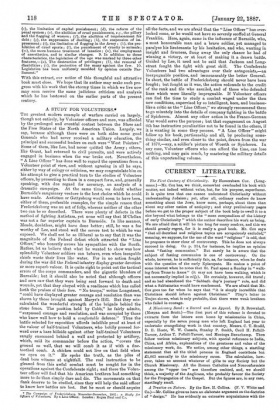CURRENT LITERATURE.
The First Century of Christianity. By Homersham Cox. (Long- mans.)—Mr. Cox has, we think, somewhat overloaded his book with matter, not indeed without value, but, for his purpose, superfluous. It is quite true that one cannot understand Christianity without understanding Judaism ; yet, after all, ordinary readers do know something about the Jews, know more, perhaps, about them than about any other nation of antiquity ; and sixty preliminary pages before we get to the proper subject of the book help to swell it to a size beyond what belongs to the "mere compendium of the history of early Christianity" which the author describes his work as being. We are afraid that it will be too long for many readers, and this we should greatly regret, for it is really a good book. Mr. Cox says "that all doctrinal and religions topics are scrupulously excluded," meaning, we suppose, for the use of the word "religious" is odd, that he proposes to steer clear of controversy. This he does not always succeed in doing. On p. 314, for instance, he implies an opinion about "fasting communion." Bat surely he is aware that the subject of fasting communion is one of controversy. On the whole, however, he is sufficiently fair, as, for instance, when he deals with the question of the early Episcopate. He makes a point of some interest when he notes that St. Paul spent a Sunday in "walk- ing from Trees to Assos " (it may not have been walking, which is not necessarily implied in 7140). He certainly, however, did travel; and so had abandoned the "Sabbath day's journey" rule, and did what a Sabbatarian would have condemned. We are afraid that Mr. Cox goes too far when he says that "it is simply incredible that Christians should inform against Christians." Pliny's letter to Trajan shows, what is only probable, that there were weak brethren who failed in courage.


































 Previous page
Previous page